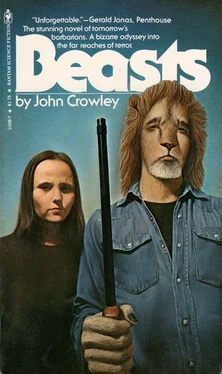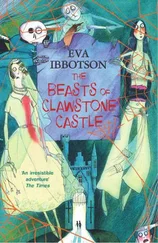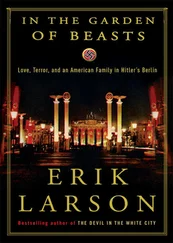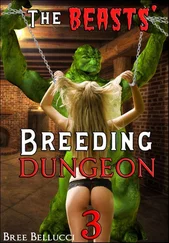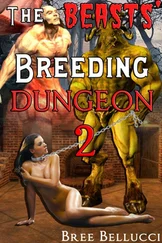Before bringing in the birds he had established himself at the tower. He had biked in supplies for a three-month stay: medicine, a bedroll, a heater and a stove, food, two shotguns and ammunition. The greater part of his duties over the next month or so would be to hunt for his falcons until they could do so for themselves. Unless they became familiar with the sight and taste of feral prey, they might be unable to recognize it as food — they might kill birds, because powerful instincts commanded it, but they might not know enough to eat what they killed. Loren must every day produce fresh-killed game for them to eat.
It was too late in the day now to go out, though; he would start the next morning. He had toyed with the idea of bringing in an adult trained hawk and hunting with it for his young ones; but — even though the immense difficulties of this plan intrigued him — in the end he decided against it; if for any of a thousand reasons the adult couldn’t catch enough to feed the young, it would be his fault. The life his hawks must be prepared for was so arduous that they must have all his attention now.
He sat a long time outside the door of the stone building he had outfitted for himself, while the endless twilight lingered, fading from dusty yellow to lucent blue. Far above him in their tower his hawks would be grooming, tucking down their fierce heads, growing still, and at last sleeping. Loren had not enough duties to occupy his nights, and though he would go to sleep early, to be up before dawn, still he felt some anxiety over the blank hours of darkness ahead: anxiety that was causeless and that he never allowed to rise quite into consciousness. He made a simple meal meticulously and ate it slowly. He ordered his stores. He prepared for the next morning’s hunt. He lit a lamp and began to look through the magazines.
Whoever it was that had camped here — last summer, he judged by the magazines’ dates — had been an omnivorous reader, or looker anyway; they were mostly picture magazines. The camper had left few other traces of himself — some broken wine bottles and empty cans. From some impulse to purify his quarters for his own monkish purposes, Loren at first had thought to burn these magazines. They seemed intrusive on his solitude, freighted as they were with human wishes and needs and boredoms. He hadn’t burned them. Now almost guiltily he began to leaf through them.
North Star was a government magazine he had not often bothered to look at. This issue was a fat one, “Celebrating a Decade of Peace and Autonomy.” On its cover was the proud blond head of the Director of the Northern Autonomy, Dr. Jarrell Gregorius. Doctor of what? Loren wondered. An honorific, he supposed; just as it was an honorific to call the last ten years peaceful simply because they had not been years of total war.
Ten years ago the partition of the American continent had ended years of civil war. Almost arbitrarily — as quarreling parents and children retreat into separate rooms and slam doors on one another — ten large Autonomies and several smaller ones, independent city-states, mostly, had formed themselves out of the senescent American nation. They quarreled endlessly among themselves, and also with the stub of Federal government that still remained, supposedly as an arbitrator but in fact as an armed conspiracy of old bureaucrats and young technocrats desperately trying to retain and advance their power, like a belligerent old Holy Roman Empire intent on controlling rebellious princedoms. For young people of Loren’s persuasion the long and still-continuing struggle had given rise to one great good: it had halted, almost completely, the uniform and mindless “development” of the twentieth century; halted the whole vast machine of Progress, fragmenting it, even (which had never in the old days seemed possible) forced its wheels to grind in reverse. All the enormous and prolonged sufferings that this reversal had brought on a highly civilized nation long dependent on resource management, on development, on the world of artifacts, could not alter Loren’s pleasure in watching or reading about the old wilderness reclaiming a recreational facility or the grass covering silently the scars of strip mines and military bases.
So he looked kindly on the vain doctor. If it was only vanity and stupidity that had precipitated the partition, and kept these impotent little pseudonations alive and at one another’s throats, then a theory of Loren’s — not his alone — was proved out: that even the flaws of a certain species can contribute to the strength of the earth’s whole life.
It may be now, though — the magazine gave some hints of it — that people had “learned their lesson” and felt it was time to consider plans for reunification. This same Dr. Gregorius thought so. Loren doubted whether the blood and the hatreds could be so quickly forgotten. “Independence,” political independence, was a vast, even a silly myth; but it was less harmful than the myths of unity and interdependence that had led to the old wars: less harmful anyway to that wild world that Loren loved better than the lives and places of men. Let men be thrown onto their own resources, let them re-create their lives in small; let them live in chaos, and thus lose their concerted power to do harm to the world: that’s what independence meant, practically speaking, whatever odd dreams it was dressed in in men’s minds. Loren hoped it would last. Our great, independent Northern Autonomy. Long may it wave. He let the pages of North Star flutter together and was about to throw it back on the pile when a photograph caught his eye.
This might have been Gregorius as a boy. It was in fact his son, and there were differences. The father’s face seemed to possess a fragile, commanding strength; the son’s face, less chiseled, the eyes darker-lashed and deeper, the mouth fuller, seemed more willful and dangerous. It was a compelling, not a commanding, face. A young, impatient godling. His name was Sten. Loren folded the magazine open there and propped it beneath the lamp. When he had undressed and done his exercises, the boy watching, he turned down the lamp; the boy faded into darkness. When he awoke at dawn, the face was still there, pale in the gray light, as though he too had just awakened.
There is a certain small madness inherent in solitude; Loren knew that. He would soon begin to talk aloud, not only to the birds but to himself as well. Certain paths in his consciousness would become welltrodden ways because there was no other impinging consciousness to deflect him. A hundred years ago, Yerkes — one of the saints in Loren’s brief canon — had said about chimpanzees that one chimpanzee is no chimpanzee. Men were like that too, except that eidetic memory and the oddity of self-consciousness could create one or a dozen others for a man alone to consort with: soon Loren would be living alone in company, the company of selves whom he could laugh with, chastise, chat with; who could tyrannize him, entertain him, bedevil him.
At noon he split with his sheath knife the skulls of the three quail he had shot and offered the brains to his charges: the best part. “Now look, there are only three among the four of you — none of that now — what’s the matter? Eat, damn you — here, I’ll break it up. God, what manners… He let them tear at one of the quail while he dressed the other two for later. He watched the falcons’ tentative, miniature voracity with fascination. He looked up; heavy clouds were gathering from the sea.
The next day it rained steadily, somberly, without pause. He had to light his lamp to go on with his magazines; he wore a hat against the dripping from the rotted ceiling. A chipmunk took refuge with him in the house, and he thought of trying to catch it for his hawks, but let it stay instead. Twice he splashed over to the tower and fed the birds steak and the remnants of quail, and returned through the puddles to his place by the lamp.
Читать дальше
